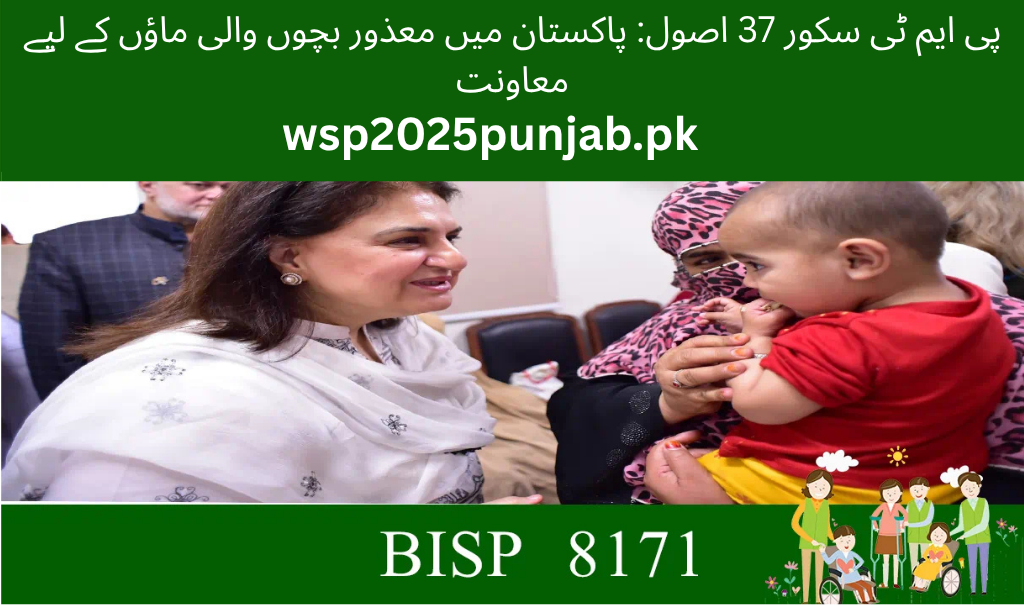In Pakistan, most poor families rely on government assistance for staying afloat each day. Benazir Income Support Programme (BISP) is one such scheme that assists the poor women with cash support. But how does a mother fare if her poverty score, or the PMT score, crosses just a little beyond the threshold?
In 2025, the government specially decided to keep assisting mothers of disabled children even if their PMT score increases up to 37. This shift provides thousands of poor families an opportunity to remain insured.
What Is PMT Score and Why It Matters
The PMT (Proxy Means Test) score is a figure that the government uses to determine who should receive welfare programs. This score takes into consideration a number of factors, such as:
- Income of family
- Number of household members
- Type of home and property
- Education level and job position
Typically, individuals with a score of 32 or lower qualify for BISP benefits. But if your score increases beyond 32, you risk losing that benefit—except if you have a disabled child.
The Special Rule for PMT Scores 33 to 37
Thanks to the new special protection provision, any mother caring for a disabled child can stay in the program if her PMT score is between 33 and 37.
This is a rule that was formulated as the government realized that bringing up a handicapped child takes additional money, time, and effort. The standard PMT system does not account for such special needs appropriately, so this exception provides such mothers with an equal opportunity to keep receiving assistance.
Why This Policy Is Important
Disabled children’s families incur higher healthcare and caregiving expenses compared to others. These families may have to spend on:
- Routine doctor consultations and check-ups
- Special medication or therapy
- Wheelchairs or assistive devices
- Transportation to healthcare facilities
The majority of poor families do not have the ability to fund these expenses themselves. The government, by providing a higher PMT score for such families, is demonstrating sympathies and support towards inclusion.
Families with disabled children face higher medical and caregiving costs than others. They often need to pay for:
-
Regular doctor visits and checkups
-
Special medicine or therapy
-
Wheelchairs or assistive tools
-
Transportation to medical facilities
Most poor families cannot afford these costs without help. By allowing a higher PMT score for such households, the government is showing compassion and support for inclusion.
Who Can Benefit from This Rule?
You are eligible for this policy if:
- You are a mother or guardian of a child with a validated disability
- Your PMT score is 33-37
- You have formal evidence of your child’s disability (certificate or ID)
With this policy, you are entitled to receive quarterly payments of BISP and other interventions such as healthcare and Taleemi Wazaif (stipends for education) based on your province.
How to Apply or Stay in the Program
If your PMT score is more than 32 and you have a special child, do the following:
1. Check Your PMT Score
Go to the nearest Dynamic Registration Center (DRC) or BISP office. Submit your CNIC to learn your PMT score.
2. Obtain Disability Documents
Ensure that you possess one or more of the mentioned below:
- Disability certificate of a government hospital
- Disability CNIC or B-form issued by NADRA
- Social Welfare Department verification
3. Update Family Information
Inform BISP of any changes in your household, including:
- New children born
- A child beginning or leaving school
- Household income change
It ensures that your information is up to date and improves your chances of being retained in the program.
What Will You Receive?
If you are eligible, you can expect:
- Rs. 13,500 to Rs. 14,500 per three months (according to recent BISP reports)
- Stipends for education by Benazir Taleemi Wazaif
- Some health benefits in certain provinces
- Assistance through community services or NGOs
These assistance packages are designed to ease the life of poor mothers, particularly those caring for disabled children.
Frequently Asked Questions (FAQs)
Q. My PMT score is 35. Am I still eligible?
Yes, if you have official documents and are looking after a disabled child, you will still be eligible.
Q. What happens if my score exceeds 37?
Sadly, this is only a rule until 37. If your score is in excess, you should write to request a resurvey and explain your hardship.
Q. How do I obtain a disability certificate?
Go to your local government hospital or the Social Welfare Office. They will assist you and can forward your case to a medical board for evaluation.
Q. I have been de-listed from BISP. Can I be reinstated?
Yes, you can appeal or ask for reassessment. If your case falls under the special rule provisions, BISP can re-enroll you.
Final Thoughts
The PMT Score 37 Rule is a tiny but mighty move toward Pakistani inclusive welfare. Disabled children’s mothers have numerous challenges daily, and this rule means they will not lose their economic lifeline because their PMT score nominally rose.
If you or someone you know belongs to this category, don’t remain quiet. Go to your local BISP center, bring along the documents, and ensure that you keep receiving the assistance you are entitled to. This is not a numbers game—it’s about justice, respect, and hope.
Disclaimer: We are not affiliated with the BISP. For official information, always check the BISP website or contact the helpline.



